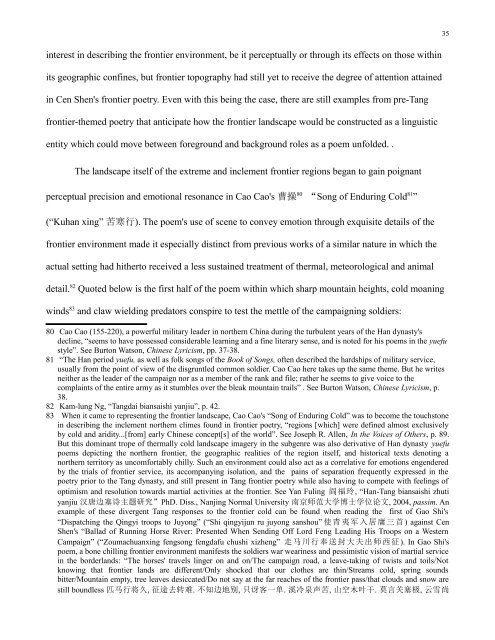View/Open - University of Victoria
View/Open - University of Victoria
View/Open - University of Victoria
You also want an ePaper? Increase the reach of your titles
YUMPU automatically turns print PDFs into web optimized ePapers that Google loves.
interest in describing the frontier environment, be it perceptually or through its effects on those within<br />
its geographic confines, but frontier topography had still yet to receive the degree <strong>of</strong> attention attained<br />
in Cen Shen's frontier poetry. Even with this being the case, there are still examples from pre-Tang<br />
frontier-themed poetry that anticipate how the frontier landscape would be constructed as a linguistic<br />
entity which could move between foreground and background roles as a poem unfolded. .<br />
35<br />
The landscape itself <strong>of</strong> the extreme and inclement frontier regions began to gain poignant<br />
perceptual precision and emotional resonance in Cao Cao's 曹 操<br />
80<br />
“Song <strong>of</strong> Enduring Cold 81 ”<br />
(“Kuhan xing” 苦 寒 行 ). The poem's use <strong>of</strong> scene to convey emotion through exquisite details <strong>of</strong> the<br />
frontier environment made it especially distinct from previous works <strong>of</strong> a similar nature in which the<br />
actual setting had hitherto received a less sustained treatment <strong>of</strong> thermal, meteorological and animal<br />
detail. 82 Quoted below is the first half <strong>of</strong> the poem within which sharp mountain heights, cold moaning<br />
winds 83 and claw wielding predators conspire to test the mettle <strong>of</strong> the campaigning soldiers:<br />
80 Cao Cao (155-220), a powerful military leader in northern China during the turbulent years <strong>of</strong> the Han dynasty's<br />
decline, “seems to have possessed considerable learning and a fine literary sense, and is noted for his poems in the yuefu<br />
style”. See Burton Watson, Chinese Lyricism, pp. 37-38.<br />
81 “The Han period yuefu, as well as folk songs <strong>of</strong> the Book <strong>of</strong> Songs, <strong>of</strong>ten described the hardships <strong>of</strong> military service,<br />
usually from the point <strong>of</strong> view <strong>of</strong> the disgruntled common soldier. Cao Cao here takes up the same theme. But he writes<br />
neither as the leader <strong>of</strong> the campaign nor as a member <strong>of</strong> the rank and file; rather he seems to give voice to the<br />
complaints <strong>of</strong> the entire army as it stumbles over the bleak mountain trails” . See Burton Watson, Chinese Lyricism, p.<br />
38.<br />
82 Kam-lung Ng, “Tangdai biansaishi yanjiu”, p. 42.<br />
83 When it came to representing the frontier landscape, Cao Cao's “Song <strong>of</strong> Enduring Cold” was to become the touchstone<br />
in describing the inclement northern climes found in frontier poetry, “regions [which] were defined almost exclusively<br />
by cold and aridity...[from] early Chinese concept[s] <strong>of</strong> the world”. See Joseph R. Allen, In the Voices <strong>of</strong> Others, p. 89.<br />
But this dominant trope <strong>of</strong> thermally cold landscape imagery in the subgenre was also derivative <strong>of</strong> Han dynasty yuefu<br />
poems depicting the northern frontier, the geographic realities <strong>of</strong> the region itself, and historical texts denoting a<br />
northern territory as uncomfortably chilly. Such an environment could also act as a correlative for emotions engendered<br />
by the trials <strong>of</strong> frontier service, its accompanying isolation, and the pains <strong>of</strong> separation frequently expressed in the<br />
poetry prior to the Tang dynasty, and still present in Tang frontier poetry while also having to compete with feelings <strong>of</strong><br />
optimism and resolution towards martial activities at the frontier. See Yan Fuling 阎 福 玲 , “Han-Tang biansaishi zhuti<br />
yanjiu 汉 唐 边 塞 诗 主 题 研 究 ”PhD. Diss., Nanjing Normal <strong>University</strong> 南 京 师 范 大 学 博 士 学 位 论 文 , 2004, passim. An<br />
example <strong>of</strong> these divergent Tang responses to the frontier cold can be found when reading the first <strong>of</strong> Gao Shi's<br />
“Dispatching the Qingyi troops to Juyong” (“Shi qingyijun ru juyong sanshou” 使 青 夷 军 入 居 庸 三 首 ) against Cen<br />
Shen's “Ballad <strong>of</strong> Running Horse River: Presented When Sending Off Lord Feng Leading His Troops on a Western<br />
Campaign” (“Zoumachuanxing fengsong fengdafu chushi xizheng” 走 马 川 行 奉 送 封 大 夫 出 师 西 征 ). In Gao Shi's<br />
poem, a bone chilling frontier environment manifests the soldiers war weariness and pessimistic vision <strong>of</strong> martial service<br />
in the borderlands: “The horses' travels linger on and on/The campaign road, a leave-taking <strong>of</strong> twists and toils/Not<br />
knowing that frontier lands are different/Only shocked that our clothes are thin/Streams cold, spring sounds<br />
bitter/Mountain empty, tree leaves desiccated/Do not say at the far reaches <strong>of</strong> the frontier pass/that clouds and snow are<br />
still boundless 匹 马 行 将 久 , 征 途 去 转 难 . 不 知 边 地 别 , 只 讶 客 一 单 . 溪 冷 泉 声 苦 , 山 空 木 叶 干 . 莫 言 关 塞 极 , 云 雪 尚
















